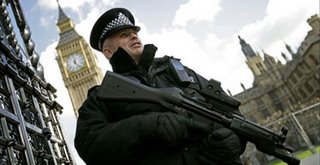Despite US President George W. Bush’s constant declarations to the effect that al-Qaeda has been weakened by the “war on terrorism” launched in the wake of the Sept. 11, 2001, attacks, analysts the world over are now revisiting this assumption (see “How not to win,” Feb. 26).
 A clear indication of this failure to eliminate the threat can be found in recent comments by no less a player in antiterrorism than Dame Eliza Manningham-Buller, the head of the British domestic intelligence service, MI5. In November, Manningham-Buller — well-known for her usually less alarmist assessments of the terrorist threat than those of the government she serves — said that since 2005 MI5 had identified 30 major terrorist plots in Britain and was monitoring the activities of — take a deep breath — no less than 1,600 Britain-based individuals from approximately 200 terrorist networks. This is on the home front alone! The exact same figures were repeated by London Metropolitan Police Deputy Commissioner Paul Stephenson at a security conference in Sydney, Australia, on Monday.
A clear indication of this failure to eliminate the threat can be found in recent comments by no less a player in antiterrorism than Dame Eliza Manningham-Buller, the head of the British domestic intelligence service, MI5. In November, Manningham-Buller — well-known for her usually less alarmist assessments of the terrorist threat than those of the government she serves — said that since 2005 MI5 had identified 30 major terrorist plots in Britain and was monitoring the activities of — take a deep breath — no less than 1,600 Britain-based individuals from approximately 200 terrorist networks. This is on the home front alone! The exact same figures were repeated by London Metropolitan Police Deputy Commissioner Paul Stephenson at a security conference in Sydney, Australia, on Monday.With the population of Great Britain established at 60.7 million as of late last year, this means that there is one terrorist suspect for every 38,000 British — an astounding figure. Such a ratio would mean that Canada, with a population of 33 million, has 868 terrorists in its midst. If this were the case, the Canadian Security Intelligence Service would have to grow something like eight-fold so that it could monitor the activities of all those suspects. And this is excludes all the other usual groups targeted by intelligence services — the usual suspects, if you will — such as China, Russia, Iran and others. Given, based on my experiences, the usual ratio (and I am being very conservative here) of 2 intelligence officers for every target of an investigation, this would mean that in Canada, more than 1,700 intelligence officers would be working on the al-Qaeda file, a figure that excludes the communication intercepts specialists, translators, and other operational staff, not to mention pay and administrative staff, lawyers, and so on. (As of last year, the total workforce at CSIS, including administration, pay services and others, was approximately 2,400.)
But what those numbers truly show is that if they are true, the West is clearly doing something wrong, so wrong, in fact, that defeat in its “war on terrorism” is almost a fait accompli. Ever since they launched the campaign against al-Qaeda and other like-minded groups in 2001, the architects of the “war on terror” have repeatedly said that this new war is as much a military campaign as it is a war for the hearts and minds of people in the Muslim world. Given the MI5 numbers, it would appear that the hearts and minds part has either gone terribly wrong — or worse, that the leadership didn’t mean what it said. This, of course, is not entirely impossible, as to this day British Prime Minister Tony Blair still refuses to acknowledge that Britain’s actions in Iraq and Afghanistan have absolutely no impact upon domestic security.
The most alarming part is that even if the figures are most likely overblown, the intelligence community and the British government believe they are true, and they don’t seem to grasp that they are indicative of a monumental failure on the diplomatic and hearts and minds front. Absent such an understanding, such figures — real or inflated — can only but go up.

No comments:
Post a Comment